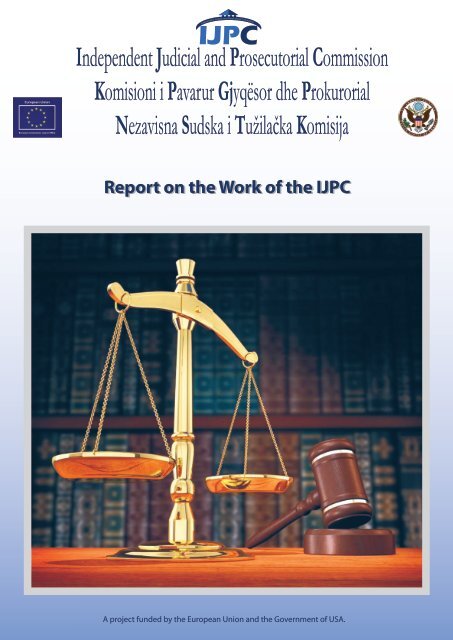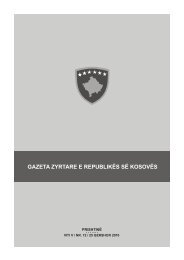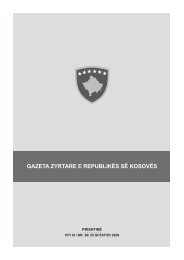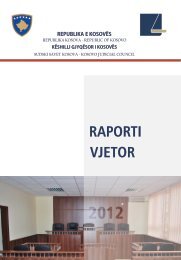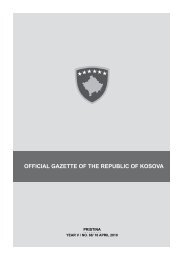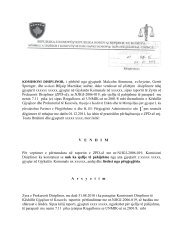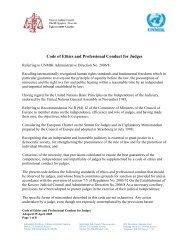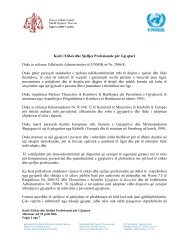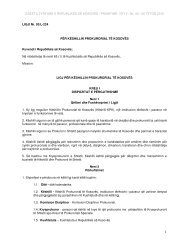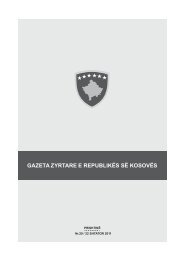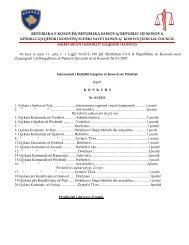Report on the Work of the IJPC
Report on the Work of the IJPC
Report on the Work of the IJPC
You also want an ePaper? Increase the reach of your titles
YUMPU automatically turns print PDFs into web optimized ePapers that Google loves.
<str<strong>on</strong>g>Report</str<strong>on</strong>g> <strong>on</strong> <strong>the</strong> <strong>Work</strong> <strong>of</strong> <strong>the</strong> <strong>IJPC</strong>
TABLE OF CONTENTSI. Executive Summary...........................................................................................1II.III.IV.Introducti<strong>on</strong>..........................................................................................................2Initial Developments.........................................................................................2Units within <strong>the</strong> Secretariat............................................................................5V. Methodology <strong>of</strong> evaluati<strong>on</strong>, interview and recommendati<strong>on</strong>..........7VI.VII.Phase I Activities and Developments.........................................................9Phase II Activities and Developments.....................................................11VIII. Phase III Activities and Developments...................................................14IX.Review Panel......................................................................................................16X. Some Noteworthy Projects Highlights.....................................................17XI.C<strong>on</strong>cluding Observati<strong>on</strong>s...............................................................................21The <strong>IJPC</strong> and its Secretariat are funded by <strong>the</strong> Commissi<strong>on</strong> and <strong>the</strong> Government <strong>of</strong> <strong>the</strong> United States
<str<strong>on</strong>g>Report</str<strong>on</strong>g> <strong>on</strong> <strong>the</strong> <strong>Work</strong> <strong>of</strong> Kosovo’sIndependent Judicial and Prosecutorial Commissi<strong>on</strong>By Timothy Baland and Keith N. WoodOctober 29, 2010I. Executive SummaryThe recently completed merit-based process for <strong>the</strong> appointment <strong>of</strong> judges and prosecutors inKosovo, undertaken by <strong>the</strong> Independent Judicial and Prosecutorial Commissi<strong>on</strong> (<strong>IJPC</strong>), andc<strong>on</strong>ducted in accordance with European Commissi<strong>on</strong> standards, c<strong>on</strong>firms a willingness <strong>of</strong> <strong>the</strong>internati<strong>on</strong>al and nati<strong>on</strong>al communities to c<strong>on</strong>fr<strong>on</strong>t <strong>the</strong> challenges for judicial reform in Kosovo.The need for judicial reform in this newly developing country is widely recognized, and <strong>the</strong>completi<strong>on</strong> <strong>of</strong> <strong>the</strong> <strong>IJPC</strong> appointment process is a welcome milest<strong>on</strong>e in <strong>the</strong> <strong>on</strong>going reformefforts.Within a few m<strong>on</strong>ths after <strong>the</strong> establishment <strong>of</strong> <strong>the</strong> United Nati<strong>on</strong>s Missi<strong>on</strong> in Kosovo in June <strong>of</strong>1999, UNMIK proceeded to appoint nati<strong>on</strong>al judges and prosecutors. However, in <strong>the</strong> absence <strong>of</strong>adequate time and resources to c<strong>on</strong>duct a thorough vetting procedure, a satisfactory evaluati<strong>on</strong> <strong>of</strong><strong>the</strong> competence and character <strong>of</strong> <strong>the</strong> appointees was not possible at that time. Dissatisfacti<strong>on</strong>with <strong>the</strong> growing case backlog, claims <strong>of</strong> corrupti<strong>on</strong> and favoritism, and general incompetencewithin <strong>the</strong> court system underscored <strong>the</strong> need for an internati<strong>on</strong>ally-led vetting and appointmentprocedure.The law which created <strong>the</strong> <strong>IJPC</strong> envisi<strong>on</strong>ed a truly independent commissi<strong>on</strong>, free from politicalor o<strong>the</strong>r outside interference. Rules <strong>of</strong> procedure and operati<strong>on</strong>al methodologies adopted by <strong>the</strong>Commissi<strong>on</strong> allowed that goal to be accomplished. The 334 judges and prosecutors who wereappointed were carefully scrutinized and rated against each o<strong>the</strong>r, resulting in selecti<strong>on</strong> <strong>of</strong> <strong>the</strong>best qualified applicant for every positi<strong>on</strong>. Sixty (60%) <strong>of</strong> <strong>the</strong> positi<strong>on</strong>s were filled by newoccupants. This represents a major transformati<strong>on</strong> <strong>of</strong> <strong>the</strong> judicial system in Kosovo.Funded by <strong>the</strong> European Uni<strong>on</strong> and <strong>the</strong> Government <strong>of</strong> USA.
Eight hundred ninety-eight (898) individuals submitted a preliminary applicati<strong>on</strong>. Aftercompleti<strong>on</strong> <strong>of</strong> <strong>the</strong> required ethics and entrance examinati<strong>on</strong>s, <strong>the</strong>re were 418 eligible candidatesfor 461 positi<strong>on</strong>s.A statistical summary <strong>of</strong> <strong>the</strong> work <strong>of</strong> <strong>the</strong> <strong>IJPC</strong> is set out in <strong>the</strong> following chart:Phase Advertised Appointed Re-appointed New Women MinoritiesPositi<strong>on</strong>sAppointeesPhase I 33 26 (78,79%) 9 (34,61%) 17 (65,38%) 11 (42,31%) 1 (3,84%)Phase II 109 86 (78,90%) 31 (36,04%) 55 (63,96%) 21 (24,4%) 6 (6,97%)Phase III 319 222 (69,59%) 92 (41,44%) 130 (58,56%) 63 (28,37%) 8 (3,60%)Total 461 334 (72,45%) 132 (39,52%) 202 (60,48%) 95 (28,44%) 15 (4,45%)2II. Introducti<strong>on</strong>The Independent Judicial and Prosecutorial Commissi<strong>on</strong> (<strong>IJPC</strong>) was created as an aut<strong>on</strong>omousbody <strong>of</strong> <strong>the</strong> Kosovo Judicial Council (KJC) by UNMIK Administrative Directi<strong>on</strong> 2008/2, whichentered into force <strong>on</strong> January 17, 2008.The <strong>IJPC</strong> was established for “<strong>the</strong> purpose <strong>of</strong> c<strong>on</strong>ducting a <strong>on</strong>e-time, comprehensive, Kosovowidereview <strong>of</strong> <strong>the</strong> suitability <strong>of</strong> all applicants for permanent appointments …as judges andprosecutors in Kosovo.” The preamble to <strong>the</strong> Administrative Directi<strong>on</strong> affirmatively notes that itwas issued “for <strong>the</strong> purpose <strong>of</strong> setting out <strong>the</strong> provisi<strong>on</strong>s governing <strong>the</strong> establishment and <strong>the</strong>operati<strong>on</strong>s <strong>of</strong> <strong>the</strong> <strong>IJPC</strong> and <strong>the</strong> <strong>IJPC</strong> Review Panel.”Secti<strong>on</strong> 2.3 <strong>of</strong> AD 2008/2 provides that <strong>the</strong> Appointment Process shall be organized in threesuccessive phases. Phase I focused <strong>on</strong> <strong>the</strong> selecti<strong>on</strong> <strong>of</strong> judges for <strong>the</strong> Supreme Court, andprosecutors in <strong>the</strong> Offices <strong>of</strong> <strong>the</strong> State Prosecutor and Special Prosecutor. Phase II focused <strong>on</strong> <strong>the</strong>selecti<strong>on</strong> <strong>of</strong> judges for <strong>the</strong> District Courts, Commercial Court, High Court for Minor Offences,and District Prosecutors. Phase III focused <strong>on</strong> <strong>the</strong> selecti<strong>on</strong> <strong>of</strong> municipal judges and prosecutors.This <str<strong>on</strong>g>Report</str<strong>on</strong>g> begins with a brief descripti<strong>on</strong> <strong>of</strong> initial developments. Reference will <strong>the</strong>n be madeto <strong>the</strong> functi<strong>on</strong>s and resp<strong>on</strong>sibilities <strong>of</strong> key units within <strong>the</strong> <strong>IJPC</strong> Secretariat. The <str<strong>on</strong>g>Report</str<strong>on</strong>g> will nextdescribe <strong>the</strong> activities and key events that took place during each <strong>of</strong> <strong>the</strong> three successive stages <strong>of</strong><strong>the</strong> project. The <str<strong>on</strong>g>Report</str<strong>on</strong>g> c<strong>on</strong>cludes with a summati<strong>on</strong> <strong>of</strong> <strong>the</strong> project’s main accomplishments.A. Memorandum <strong>of</strong> UnderstandingIII. Initial DevelopmentsOn February 25, 2008, a Memorandum <strong>of</strong> Understanding Relating to <strong>the</strong> Vetting and Selecti<strong>on</strong> <strong>of</strong>Judges and Prosecutors in Kosovo was signed by representatives <strong>of</strong> <strong>the</strong> European Commissi<strong>on</strong>,<strong>the</strong> Government <strong>of</strong> <strong>the</strong> United States and UNMIK.Funded by <strong>the</strong> European Uni<strong>on</strong> and <strong>the</strong> Government <strong>of</strong> USA.
The MOU designated <strong>the</strong> United Nati<strong>on</strong>s Office <strong>of</strong> Project Services (UNOPS) as <strong>the</strong> project’sImplementing Partner. The project was funded by <strong>the</strong> EC and US. The EC c<strong>on</strong>tributi<strong>on</strong> was 5milli<strong>on</strong> Euros; <strong>the</strong> US c<strong>on</strong>tributed $880,000.The MOU provided for <strong>the</strong> creati<strong>on</strong> <strong>of</strong> a Steering Committee. Its duties included: (a) makingrecommendati<strong>on</strong>s as to <strong>the</strong> hiring <strong>of</strong> <strong>the</strong> Project Director and internati<strong>on</strong>al judges and prosecutorswho were being c<strong>on</strong>sidered for appointment as Commissi<strong>on</strong>ers; (b) oversight and m<strong>on</strong>thlyreview <strong>of</strong> <strong>the</strong> overall progress in implementati<strong>on</strong> <strong>of</strong> <strong>the</strong> Project; (c) review and approval <strong>of</strong> formsand procedures developed by <strong>the</strong> <strong>IJPC</strong>.B. Selecti<strong>on</strong> <strong>of</strong> Director and PresidentFollowing standard recruitment procedures, Mr. Peter Bach, from Denmark, was hired asDirector, and a retired American judge, Mr. Timothy Baland, from Minnesota, USA, was hiredas President.C. First Three M<strong>on</strong>thsThe primary goals <strong>of</strong> work undertaken by <strong>the</strong> Director and President during <strong>the</strong> first threem<strong>on</strong>ths were to organize for <strong>the</strong> <strong>of</strong>ficial, public launch <strong>of</strong> <strong>the</strong> project <strong>on</strong> February 6, 2009, and toestablish and implement plans regarding IT, human resources, and <strong>the</strong> preliminary candidateelectr<strong>on</strong>ic applicati<strong>on</strong> process.While Mr. Bach initially c<strong>on</strong>centrated <strong>on</strong> getting <strong>the</strong> building equipped and <strong>on</strong> hiring key staff,Judge Baland focused <strong>on</strong> preparati<strong>on</strong> <strong>of</strong> <strong>the</strong> Preliminary Applicati<strong>on</strong> form. Both were activelyinvolved in various outreach activities, which included meetings with <strong>the</strong> President <strong>of</strong> KJC, <strong>the</strong>Executive Committee <strong>of</strong> <strong>the</strong> Judges Associati<strong>on</strong>, <strong>the</strong> Prosecutors Associati<strong>on</strong>, and <strong>the</strong> Chamber<strong>of</strong> Advocates, as well as members <strong>of</strong> <strong>the</strong> Special Prosecutor’s <strong>of</strong>fice. A special effort, whichincluded meetings and a media event, was made to reach out to potential minority communityapplicants.Following standard recruitment procedures, <strong>the</strong> remaining four internati<strong>on</strong>al Commissi<strong>on</strong>erswere selected and appointed. The initial internati<strong>on</strong>al Commissi<strong>on</strong> members were EkkehardSchulze, Germany; Andrea Veneg<strong>on</strong>i, Italy; Jean Jacques Heintz, France; and Shireen Fisher,United States <strong>of</strong> America.Secti<strong>on</strong> 2.13 <strong>of</strong> Administrative Directi<strong>on</strong> 2008/2 specifies that all candidates without excepti<strong>on</strong>were required to pass an examinati<strong>on</strong> <strong>on</strong> <strong>the</strong> relevant Codes <strong>of</strong> Ethics. This provisi<strong>on</strong> in <strong>the</strong> lawled to a decisi<strong>on</strong> to administer an ethics exam to all applicants at <strong>the</strong> very outset <strong>of</strong> <strong>the</strong>Appointment Process.In order to plan for <strong>the</strong> administrati<strong>on</strong> <strong>of</strong> such an exam, <strong>the</strong> total number <strong>of</strong> applicants had to beknown. For this purpose, an electr<strong>on</strong>ic preliminary applicati<strong>on</strong> procedure was developed. Theresulting 16-page comprehensive preliminary applicati<strong>on</strong> form c<strong>on</strong>tained 25 separate secti<strong>on</strong>s,each covering a different aspect <strong>of</strong> an applicant’s life.3Funded by <strong>the</strong> European Uni<strong>on</strong> and <strong>the</strong> Government <strong>of</strong> USA.
4February 6, 2010 Press C<strong>on</strong>ference and Official Launch <strong>of</strong> ProjectFollowing <strong>the</strong> February 6 <strong>of</strong>ficial launch <strong>of</strong> <strong>the</strong> project, <strong>the</strong> <strong>IJPC</strong> began accepting preliminaryapplicati<strong>on</strong>s. As a part <strong>of</strong> <strong>the</strong> electr<strong>on</strong>ic applicati<strong>on</strong> process, all applicants were issued arandomly-assigned <strong>IJPC</strong> identificati<strong>on</strong> number, which was used for <strong>the</strong> electr<strong>on</strong>ic tracking andretrieval <strong>of</strong> applicant informati<strong>on</strong>, and preservati<strong>on</strong> <strong>of</strong> <strong>the</strong> c<strong>on</strong>fidentiality <strong>of</strong> applicantinformati<strong>on</strong>. For example, by using applicant ID numbers, <strong>the</strong> Ethics Exams were gradedan<strong>on</strong>ymously, and <strong>the</strong> grades were posted <strong>on</strong> <strong>the</strong> <strong>IJPC</strong> web site without disclosure <strong>of</strong> <strong>the</strong> names<strong>of</strong> any applicants.C<strong>on</strong>cerns about <strong>the</strong> advisability <strong>of</strong> requiring applicants to submit <strong>the</strong> preliminary applicati<strong>on</strong>electr<strong>on</strong>ically were quickly alleviated as <strong>IJPC</strong> was flooded with applicati<strong>on</strong>s in <strong>the</strong> first twoweeks following public announcement <strong>of</strong> <strong>the</strong> applicati<strong>on</strong> period. A total <strong>of</strong> 898 preliminaryapplicati<strong>on</strong>s were received prior to <strong>the</strong> April 19 applicati<strong>on</strong> deadline.D. Creati<strong>on</strong>, Administrati<strong>on</strong> and Assessment <strong>of</strong> <strong>the</strong> Ethics and Entrance Examinati<strong>on</strong>sThe next major task was creati<strong>on</strong>, administrati<strong>on</strong> and assessment <strong>of</strong> <strong>the</strong> Ethics Exam. Acomprehensive report about <strong>the</strong> 2009 Ethics Exam was published <strong>on</strong> June 2, 2009, and for thatreas<strong>on</strong>, <strong>on</strong>ly a few brief remarks will be included here. With <strong>the</strong> assistance <strong>of</strong> an internati<strong>on</strong>alexam writing expert, exam questi<strong>on</strong>s were drafted by two <strong>IJPC</strong> Commissi<strong>on</strong>ers, two internati<strong>on</strong>alattorneys <strong>on</strong> staff with <strong>IJPC</strong>, and four local attorneys during a week-l<strong>on</strong>g workshop held understrict security.Rules <strong>of</strong> procedure, instructi<strong>on</strong>s for applicants taking <strong>the</strong> exam, and a set <strong>of</strong> guidelines for <strong>the</strong>internati<strong>on</strong>al pers<strong>on</strong>nel who m<strong>on</strong>itored <strong>the</strong> exam were adopted, published and enforced in orderFunded by <strong>the</strong> European Uni<strong>on</strong> and <strong>the</strong> Government <strong>of</strong> USA.
to preserve c<strong>on</strong>fidentiality; protect and safeguard <strong>the</strong> integrity <strong>of</strong> <strong>the</strong> process; assure fairness; andprovide equal treatment for all applicants.The Ethics Exam for applicants with seven or more years experience was held <strong>on</strong> April 26, 2009.The ethics exam for applicants with less than seven years <strong>of</strong> experience was held <strong>on</strong> May 23.Applicants’ answer sheets, which c<strong>on</strong>tained no identifying informati<strong>on</strong> except <strong>the</strong> applicant’s<strong>IJPC</strong> ID number, were graded under strict security arrangements immediately after each exam.The results from both exams were published <strong>on</strong> <strong>the</strong> <strong>IJPC</strong> web site shortly after completi<strong>on</strong> <strong>of</strong> <strong>the</strong>sec<strong>on</strong>d exam.5<strong>IJPC</strong> Ethics Exam, at <strong>the</strong> Police AcademyThe Exams successfully tested each applicant’s level <strong>of</strong> knowledge <strong>of</strong> <strong>the</strong> key principles andrules in <strong>the</strong> Codes <strong>of</strong> Ethics, and <strong>the</strong> applicant’s ability to correctly apply those rules andprinciples when c<strong>on</strong>fr<strong>on</strong>ted with ethically problematic situati<strong>on</strong>s. As previously noted,applicants who did not pass <strong>the</strong> Ethics Exam were barred from advancing fur<strong>the</strong>r in <strong>the</strong>Appointment Process.In additi<strong>on</strong> to <strong>the</strong> Ethics Exams, all applicants who were not sitting judges and prosecutors had topass an entrance exam. This exam was administered for <strong>IJPC</strong> by <strong>the</strong> Kosovo Judicial Institute.Seventy-nine (79) applicants who had 7 or more years <strong>of</strong> legal experience passed <strong>the</strong> EntryExam. By passing <strong>the</strong> entrance exam, <strong>the</strong>se applicants became eligible to apply for positi<strong>on</strong>s in<strong>the</strong> appointment process. Those with less legal experience who passed became eligible to attend<strong>the</strong> Initial Legal Educati<strong>on</strong> Program as a prerequisite to c<strong>on</strong>siderati<strong>on</strong> for appointment at a latertime.A. Pr<strong>of</strong>essi<strong>on</strong>al Assessment Unit.IV. Units within <strong>the</strong> SecretariatThe Pr<strong>of</strong>essi<strong>on</strong>al Assessment Unit (PAU), composed <strong>of</strong> four internati<strong>on</strong>al and six nati<strong>on</strong>alattorneys, ga<strong>the</strong>red informati<strong>on</strong> and assessed <strong>the</strong> pr<strong>of</strong>essi<strong>on</strong>al qualificati<strong>on</strong>s <strong>of</strong> each applicant.Funded by <strong>the</strong> European Uni<strong>on</strong> and <strong>the</strong> Government <strong>of</strong> USA.
Three <strong>of</strong> <strong>the</strong> internati<strong>on</strong>al members <strong>of</strong> <strong>the</strong> PAU had previously worked <strong>on</strong> a similar judicialappointment project in Bosnia from 2002 – 2004.The duties <strong>of</strong> <strong>the</strong> PAU included: verifying that applicants met all necessary legal criteria;ga<strong>the</strong>ring and assessing statistical data and o<strong>the</strong>r job-performance informati<strong>on</strong> <strong>on</strong> applicants;obtaining comments about each applicant from pr<strong>of</strong>essi<strong>on</strong>al colleagues and former employers;securing informati<strong>on</strong> from local instituti<strong>on</strong>s regarding each applicant’s compliance with propertylaws and court rulings <strong>on</strong> property claims; obtaining and evaluating reports from <strong>the</strong> Office <strong>of</strong>Disciplinary Counsel regarding alleged misc<strong>on</strong>duct by judges and prosecutors.Informati<strong>on</strong> ga<strong>the</strong>red and evaluated by <strong>the</strong> PAU <strong>on</strong> each <strong>of</strong> <strong>the</strong> applicants who were invited tointerview was summarized in an individual, c<strong>on</strong>fidential Pr<strong>of</strong>ile <str<strong>on</strong>g>Report</str<strong>on</strong>g> which was provided to<strong>the</strong> Commissi<strong>on</strong>’s Evaluati<strong>on</strong> Panel members prior to each applicant’s interview. Nati<strong>on</strong>al PAU<strong>of</strong>ficers attended applicants’ interviews and assisted in <strong>the</strong> evaluati<strong>on</strong> <strong>of</strong> <strong>the</strong> applicant’s writingability and verbal communicati<strong>on</strong> skills.6F. Judicial Vetting Unit.Nati<strong>on</strong>al PAU OfficersThe primary resp<strong>on</strong>sibility <strong>of</strong> <strong>the</strong> Judicial Vetting Unit (JVU) was to ga<strong>the</strong>r pers<strong>on</strong>al backgroundinformati<strong>on</strong> about each candidate, to examine and evaluate that informati<strong>on</strong>, and to report itsfindings to <strong>the</strong> Commissi<strong>on</strong>.JVU c<strong>on</strong>sisted <strong>of</strong> ten internati<strong>on</strong>al investigators and an equal number <strong>of</strong> Kosovar investigators.JVU <strong>of</strong>ficers worked in two-pers<strong>on</strong> teams c<strong>on</strong>sisting <strong>of</strong> <strong>on</strong>e internati<strong>on</strong>al and <strong>on</strong>e nati<strong>on</strong>al<strong>of</strong>ficer. As <strong>the</strong> result <strong>of</strong> efforts undertaken by JVU early in <strong>the</strong> project, <strong>IJPC</strong> entered intoMemorandums <strong>of</strong> Understanding with local and internati<strong>on</strong>al instituti<strong>on</strong>s (such as Interpol, <strong>the</strong>Kosovo Anti-Corrupti<strong>on</strong> Agency, Kosovo Property Agency and <strong>the</strong> Kosovo Police Service)which allowed <strong>IJPC</strong> to solicit and obtain informati<strong>on</strong> possessed by those agencies about eachcandidate. MOU’s were entered into with some 31 different instituti<strong>on</strong>s and agencies.Funded by <strong>the</strong> European Uni<strong>on</strong> and <strong>the</strong> Government <strong>of</strong> USA.
In doing <strong>the</strong>ir work, JVU <strong>of</strong>ficers met with each applicant to determine whe<strong>the</strong>r all requireddocuments had been received. Once this was verified, JVU created a separate file <strong>on</strong> eachapplicant. The documents were categorized, paginated, and placed in <strong>the</strong> file in accordance witha uniform Table <strong>of</strong> C<strong>on</strong>tents. Any discrepancies or questi<strong>on</strong>s regarding <strong>the</strong> sufficiency oraccuracy <strong>of</strong> <strong>the</strong> informati<strong>on</strong> provided by a candidate were discussed by JVU <strong>of</strong>ficers with <strong>the</strong>applicant, who was given <strong>the</strong> opportunity to correct or supplement <strong>the</strong> informati<strong>on</strong>.7Rules <strong>of</strong> Procedure adopted by <strong>the</strong> Commissi<strong>on</strong> specified that <strong>the</strong> candidate had <strong>the</strong> burden <strong>of</strong>pro<strong>of</strong> to provide <strong>IJPC</strong> with additi<strong>on</strong>al informati<strong>on</strong> or o<strong>the</strong>r explanatory material in an attempt tosatisfactorily address reas<strong>on</strong>able c<strong>on</strong>cerns about any aspect <strong>of</strong> a candidate’s qualificati<strong>on</strong>s,integrity or competence. JVU also c<strong>on</strong>ducted community checks <strong>on</strong> each applicant. Once <strong>the</strong>JVU team completed its background check, <strong>the</strong> team prepared a c<strong>on</strong>fidential report <strong>on</strong> eachcandidate which was submitted to <strong>the</strong> Commissi<strong>on</strong> prior to each candidate’s interview.1. The SettingV. Methodology <strong>of</strong> evaluati<strong>on</strong>, interview and recommendati<strong>on</strong>Interviews were held at <strong>the</strong> <strong>IJPC</strong> premises in Pristina. Present in <strong>the</strong> interview were three Panelmembers, <strong>on</strong>e commissi<strong>on</strong> legal <strong>of</strong>ficer, and a PAU <strong>of</strong>ficer. Language Unit staff providedsimultaneous translati<strong>on</strong> <strong>of</strong> questi<strong>on</strong>s and answers from an enclosed, sound-pro<strong>of</strong> booth whichafforded interpreters with visual access to <strong>the</strong> interview room proper.Evaluati<strong>on</strong> Panel members in interview roomFunded by <strong>the</strong> European Uni<strong>on</strong> and <strong>the</strong> Government <strong>of</strong> USA.
82. The FileEach applicant’s file c<strong>on</strong>tained four secti<strong>on</strong>s: Applicati<strong>on</strong> Documents; Criminal BackgroundChecks; Community Checks; and Pr<strong>of</strong>essi<strong>on</strong>al Activities. Each <strong>of</strong> <strong>the</strong>se secti<strong>on</strong>s c<strong>on</strong>tainedmultiple sub-secti<strong>on</strong>s. Applicants were allowed to review <strong>the</strong> informati<strong>on</strong> in <strong>the</strong> file <strong>the</strong> weekbefore <strong>the</strong> interview, and supplement <strong>the</strong> informati<strong>on</strong> if <strong>the</strong> candidate wished to do so.3. Evaluati<strong>on</strong> GridsApplicants were evaluated <strong>on</strong> <strong>the</strong> basis <strong>of</strong> <strong>the</strong> criteria set forth in Secti<strong>on</strong>s 3.1 and 3.2 <strong>of</strong> UNMIKAdministrative Directi<strong>on</strong> 2008/2. These criteria were described in detail in Article 5 <strong>of</strong> <strong>the</strong> Rules<strong>of</strong> Procedure Relating to <strong>the</strong> C<strong>on</strong>duct <strong>of</strong> Interviews, which were posted <strong>on</strong> <strong>the</strong> <strong>IJPC</strong> web site l<strong>on</strong>gbefore any interviews took place. The criteria were incorporated into an Evaluati<strong>on</strong> Grid whichc<strong>on</strong>tained two main secti<strong>on</strong>s: Integrity and Competence. Separate evaluati<strong>on</strong> grids were createdto help assess each applicant’s verbal communicati<strong>on</strong> skills and writing ability. The writingability assessment was based up<strong>on</strong> a short writing assignment that was completed by eachcandidate immediately after <strong>the</strong> interview. Applicants for leadership positi<strong>on</strong>s were alsoevaluated <strong>on</strong> <strong>the</strong>ir managerial skills.4. Interview Questi<strong>on</strong>sStandardized interview questi<strong>on</strong>s were prepared for each <strong>of</strong> <strong>the</strong> criteria about which questi<strong>on</strong>swere to be asked during <strong>the</strong> interview. This was d<strong>on</strong>e to ensure that each applicant was evaluated<strong>on</strong> an equal basis with <strong>the</strong> o<strong>the</strong>r applicants for <strong>the</strong> same positi<strong>on</strong>. If an applicant’s answer wasunclear, inadequate or unsatisfactory, Evaluati<strong>on</strong> Panel members were free to supplement <strong>the</strong>standardized questi<strong>on</strong>s to secure <strong>the</strong> additi<strong>on</strong>al informati<strong>on</strong> deemed relevant to <strong>the</strong> criteria. Tohelp ensure that Evaluati<strong>on</strong> Panel members shared a comm<strong>on</strong> understanding <strong>of</strong> what c<strong>on</strong>stituteda satisfactory answer to <strong>the</strong> standardized interview questi<strong>on</strong>s, background materials whichdescribed <strong>the</strong> key elements implicated by each <strong>of</strong> <strong>the</strong> criteria were assembled, distributed to andreviewed by panel members prior to <strong>the</strong>ir participati<strong>on</strong> in any interviews.Evaluati<strong>on</strong> Panel members in interview roomFunded by <strong>the</strong> European Uni<strong>on</strong> and <strong>the</strong> Government <strong>of</strong> USA.
95. Utilizati<strong>on</strong> <strong>of</strong> <strong>the</strong> Evaluati<strong>on</strong> GridEach <strong>of</strong> <strong>the</strong> criteria in <strong>the</strong> Evaluati<strong>on</strong> Grid was assigned a maximum number <strong>of</strong> points which anapplicant could be awarded for that criteri<strong>on</strong>. Broadly speaking, each Evaluati<strong>on</strong> Panel memberassessed each applicant’s resp<strong>on</strong>ses to interview questi<strong>on</strong>s <strong>on</strong> a five-point scale: 1.Unacceptable;2. Poor; 3. Acceptable; 4. More than acceptable, and; 5. Superior. The panel members used thisfive-point scale to evaluate <strong>the</strong> thoroughness and quality <strong>of</strong> each applicant’s answers to <strong>the</strong>interview questi<strong>on</strong>s, and to c<strong>on</strong>sider <strong>the</strong> file informati<strong>on</strong> that was relevant to <strong>the</strong> assessment <strong>of</strong>each <strong>of</strong> <strong>the</strong> criteria.The Commissi<strong>on</strong> decided that <strong>the</strong> maximum number <strong>of</strong> points that could be awarded for integritywas 90 points. The maximum number <strong>of</strong> points that could be earned by a candidate forCompetency was 80 points, and <strong>the</strong> maximum number <strong>of</strong> points that could be earned forManagerial Competency was 40 points.Kosovo law requires that judicial and prosecutorial nominees possess “high moral integrity.” Forthat reas<strong>on</strong>, <strong>the</strong> Commissi<strong>on</strong> decided that an applicant had to achieve a minimum score <strong>of</strong> at least60 points <strong>on</strong> Integrity in order to be c<strong>on</strong>sidered for appointment.Each applicant was scored separately by each evaluati<strong>on</strong> panel member. Individual scores weretabulated and composite scores calculated. Applicants were <strong>the</strong>n ranked from high to lowaccording to <strong>the</strong>ir composite scores. Applicants with <strong>the</strong> highest rankings were nominated, and<strong>the</strong>ir names and files were delivered to <strong>the</strong> KJC.A. Announcement <strong>of</strong> Phase I Positi<strong>on</strong>sVI. Phase I Activities and DevelopmentsOn May 25, 2009, <strong>IJPC</strong> announced vacancies for 16 Supreme Court <strong>of</strong> Kosovo positi<strong>on</strong>s, 7positi<strong>on</strong>s in <strong>the</strong> Office <strong>of</strong> <strong>the</strong> State Prosecutor, and 10 positi<strong>on</strong>s in <strong>the</strong> Office <strong>of</strong> <strong>the</strong> SpecialProsecutor. The same announcement was also published in Kosovo’s major Albanian andSerbian language newspapers and posted in courthouses and o<strong>the</strong>r public places across Kosovo.The applicati<strong>on</strong> form for <strong>the</strong>se positi<strong>on</strong>s, which was accessible <strong>on</strong> <strong>the</strong> <strong>IJPC</strong> website, allowed acandidate to indicate, in <strong>the</strong> order <strong>of</strong> preference, an interest in up to four different positi<strong>on</strong>s.A total <strong>of</strong> 65 individuals submitted applicati<strong>on</strong>s. Fifty-nine (59) <strong>of</strong> <strong>the</strong> applicants met all <strong>of</strong> <strong>the</strong>required eligibility criteria. JVU background checks and PAU assessments <strong>of</strong> <strong>the</strong>ir pr<strong>of</strong>essi<strong>on</strong>alqualificati<strong>on</strong>s were <strong>the</strong>n undertaken, and <strong>the</strong> candidates were scheduled and invited forinterviews that were held between August 24 and September 11, 2009. All candidates for <strong>the</strong>Supreme Court and Office <strong>of</strong> <strong>the</strong> State Prosecutor, and most <strong>of</strong> <strong>the</strong> candidates for <strong>the</strong> SpecialProsecutors’ Office, were interviewed during those three weeks. The remaining candidates for<strong>the</strong> Special Prosecutors’ Office were interviewed in October.Funded by <strong>the</strong> European Uni<strong>on</strong> and <strong>the</strong> Government <strong>of</strong> USA.
10B. Transmittal <strong>of</strong> Recommendati<strong>on</strong>s for Phase I positi<strong>on</strong>s to KJCThe names <strong>of</strong> candidates who were recommended by <strong>IJPC</strong> for appointment to <strong>the</strong> Supreme Courtand Office <strong>of</strong> <strong>the</strong> State Prosecutor were transmitted to <strong>the</strong> Kosovo Judicial Council <strong>on</strong>September.18. Following completi<strong>on</strong> <strong>of</strong> <strong>the</strong> interviews for Special Prosecutor in late October, <strong>the</strong> names <strong>of</strong>candidates who were recommended by <strong>IJPC</strong> for appointment to that <strong>of</strong>fice were sent to KJC <strong>on</strong>November 3.As required by AD 2008/2, KJC was provided with a Written Statement <strong>of</strong> Reas<strong>on</strong>s in support <strong>of</strong><strong>IJPC</strong>’s recommendati<strong>on</strong> <strong>of</strong> each candidate.There are 16 positi<strong>on</strong>s <strong>on</strong> <strong>the</strong> Supreme Court, <strong>on</strong>e <strong>of</strong> which is President. Three <strong>of</strong> <strong>the</strong> positi<strong>on</strong>s<strong>on</strong> <strong>the</strong> Supreme Court are reserved for individuals from <strong>the</strong> n<strong>on</strong>-majority communities <strong>of</strong>Kosovo. There are seven positi<strong>on</strong>s in <strong>the</strong> Office <strong>of</strong> <strong>the</strong> State Prosecutor, <strong>on</strong>e <strong>of</strong> which is a ChiefProsecutor, and <strong>the</strong>re are ten positi<strong>on</strong>s in <strong>the</strong> Office <strong>of</strong> <strong>the</strong> Special Prosecutor, <strong>on</strong>e <strong>of</strong> which is aDeputy Chief.<strong>IJPC</strong> recommended 13 ethnic majority candidates for <strong>the</strong> Supreme Court, including President,and <strong>on</strong>e ethnic minority candidate. <strong>IJPC</strong> recommended seven individuals, including <strong>the</strong> ChiefProsecutor and <strong>on</strong>e minority, for <strong>the</strong> Office <strong>of</strong> <strong>the</strong> State Prosecutor. <strong>IJPC</strong> recommended tenindividuals, including <strong>the</strong> Deputy Chief and <strong>on</strong>e minority, for <strong>the</strong> Office <strong>of</strong> <strong>the</strong> SpecialProsecutor. The same minority pers<strong>on</strong> was <strong>on</strong> <strong>the</strong> list for State Prosecutor and SpecialProsecutor, and <strong>on</strong>e <strong>of</strong> <strong>the</strong> candidates for Supreme Court was also <strong>on</strong> <strong>the</strong> list for SpecialProsecutor. Thus, <strong>IJPC</strong> submitted a total <strong>of</strong> 29 names for 33 Phase I positi<strong>on</strong>s.Unfortunately, before KJC submitted any names to <strong>the</strong> President <strong>of</strong> Kosovo, <strong>on</strong>e <strong>of</strong> <strong>the</strong>candidates recommended by <strong>IJPC</strong> for <strong>the</strong> Supreme Court died, and two o<strong>the</strong>rs, including <strong>the</strong>minority candidate, withdrew <strong>the</strong>ir names. KJC submitted its recommendati<strong>on</strong>s to <strong>the</strong> Presidentin January 2010. KJC recommended eight individuals, including President, for <strong>the</strong> SupremeCourt; four, including Chief, for <strong>the</strong> Office <strong>of</strong> State Prosecutor; and ten, including <strong>the</strong> DeputyChief, for <strong>the</strong> Office <strong>of</strong> <strong>the</strong> Special Prosecutor.These individuals were appointed by <strong>the</strong> Kosovo President in a cerem<strong>on</strong>y held February 16,2010. The cerem<strong>on</strong>y was attended by ambassadors from a number <strong>of</strong> countries and high rankingrepresentatives from major rule <strong>of</strong> law d<strong>on</strong>ors active in Kosovo.Funded by <strong>the</strong> European Uni<strong>on</strong> and <strong>the</strong> Government <strong>of</strong> USA.
11A. Announcement <strong>of</strong> Phase II Positi<strong>on</strong>sFebruary 16, 2010 Phase I Appointment Cerem<strong>on</strong>yVII. Phase II Activities and DevelopmentsAD 2008/2 specifies that Phase II <strong>of</strong> <strong>the</strong> Appointment Process is to focus <strong>on</strong> <strong>the</strong> selecti<strong>on</strong> <strong>of</strong>judges and prosecutors at <strong>the</strong> District level, toge<strong>the</strong>r with positi<strong>on</strong>s <strong>on</strong> <strong>the</strong> Commercial Court and<strong>the</strong> High Court for Minor Offences. The vacancy announcement for <strong>the</strong>se positi<strong>on</strong>s waspublished <strong>on</strong> July 7, 2009, <strong>on</strong> <strong>the</strong> <strong>IJPC</strong> website and in newspapers as was d<strong>on</strong>e with <strong>the</strong> Phase Iannouncement, with an applicati<strong>on</strong> deadline <strong>of</strong> August 3rd. There were a total <strong>of</strong> 101 positi<strong>on</strong>s tobe c<strong>on</strong>sidered during this phase <strong>of</strong> <strong>the</strong> project.Plans were made to c<strong>on</strong>duct <strong>the</strong> Phase II interviews in two waves: <strong>the</strong> first wave, starting inNovember, would c<strong>on</strong>centrate <strong>on</strong> <strong>the</strong> 54 judicial and prosecutorial positi<strong>on</strong>s located in Pristina,while <strong>the</strong> sec<strong>on</strong>d wave, starting in early February 2010, would c<strong>on</strong>centrate <strong>on</strong> <strong>the</strong> 47 positi<strong>on</strong>slocated in <strong>the</strong> o<strong>the</strong>r four regi<strong>on</strong>s <strong>of</strong> Kosovo. For each wave, it was anticipated that <strong>the</strong> interviewswould be c<strong>on</strong>ducted without interrupti<strong>on</strong> (except for <strong>the</strong> Christmas holidays) for as many weeksas it took to interview all applicants.B. New internati<strong>on</strong>al Commissi<strong>on</strong>ers and c<strong>on</strong>duct <strong>of</strong> Phase II interviewsBy late summer 2009, it became clear that n<strong>on</strong>e <strong>of</strong> <strong>the</strong> originally c<strong>on</strong>tracted internati<strong>on</strong>alCommissi<strong>on</strong>ers, except for Commissi<strong>on</strong> President Timothy Baland, would be able to make <strong>the</strong>kind <strong>of</strong> time commitment that was needed in order for Phase II interviews to be completed withinproper timelines. As a result, an effort was undertaken to recruit Reserve Commissi<strong>on</strong>ers.Funded by <strong>the</strong> European Uni<strong>on</strong> and <strong>the</strong> Government <strong>of</strong> USA.
In November 2009, Judge Jan Erik Oja, from Sweden, and retired Judge Dennis Luebke, from<strong>the</strong> United States, replaced two <strong>of</strong> <strong>the</strong> original commissi<strong>on</strong> members. Each <strong>of</strong> <strong>the</strong>m had priorexperience in Kosovo.Phase II interviews began as scheduled <strong>on</strong> November 2 nd and c<strong>on</strong>tinued through November 26 th .The remaining Phase II interviews were delayed until January due to <strong>the</strong> replacement <strong>of</strong> twomore <strong>of</strong> <strong>the</strong> original internati<strong>on</strong>al Commissi<strong>on</strong>ers. Anette Milk, a senior prosecutor fromGermany, and Horst Proetel, a retired German Judge, both <strong>of</strong> whom had extensive priorexperience in Kosovo, joined <strong>the</strong> Commissi<strong>on</strong>.Interviews for Phase II positi<strong>on</strong>s resumed <strong>on</strong> January 11 and c<strong>on</strong>tinued through February 25. Bythat date, interviews were completed for District Court and District prosecutor positi<strong>on</strong>s in bothPristina and Mitrovica, and for <strong>the</strong> Commercial Court and <strong>the</strong> High Court for Minor Offences.Interviews for Phase II positi<strong>on</strong>s in Gjilan, Peja and Prizren resumed <strong>on</strong> March 8, and c<strong>on</strong>tinuedthrough April 27.C. New nati<strong>on</strong>al Commissi<strong>on</strong>ersAD 2008/2 provides for a gradual increase in <strong>the</strong> number <strong>of</strong> Commissi<strong>on</strong>ers from fiveCommissi<strong>on</strong>ers in Phase I, to eight Commissi<strong>on</strong>ers in Phase II, and ten Commissi<strong>on</strong>ers in PhaseIII.The additi<strong>on</strong>al Commissi<strong>on</strong>ers were required to be judges or prosecutors selected from am<strong>on</strong>gthose appointed in <strong>the</strong> immediately preceding phase <strong>of</strong> <strong>the</strong> appointment process.On March 8, 2010, <strong>the</strong> President <strong>of</strong> Kosovo appointed three new members to <strong>the</strong> Commissi<strong>on</strong>:Enver Peci and Valdete Daka, newly appointed Judges <strong>on</strong> <strong>the</strong> Supreme Court, and Sevdije GashiMorina, newly appointed Deputy Chief Special Prosecutor. The three new nati<strong>on</strong>alCommissi<strong>on</strong>ers were promptly integrated into <strong>the</strong> work <strong>of</strong> <strong>the</strong> Commissi<strong>on</strong>.D. Phase II recommendati<strong>on</strong>s and appointmentsPlenary sessi<strong>on</strong>s <strong>of</strong> <strong>the</strong> Commissi<strong>on</strong> were held in early April. On April 14, <strong>IJPC</strong> transmitted toKJC <strong>the</strong> names <strong>of</strong> 48 candidates who were recommended for appointment to District Court andDistrict prosecutor positi<strong>on</strong>s in Pristina and Mitrovica, and for positi<strong>on</strong>s <strong>on</strong> <strong>the</strong> CommercialCourt and High Court for Minor Offences. KJC forwarded most <strong>of</strong> those names to <strong>the</strong> Office <strong>of</strong><strong>the</strong> President <strong>on</strong> April 28 th . The 14 candidates recommended by <strong>IJPC</strong> for District level positi<strong>on</strong>sin Mitrovica were appointed by <strong>the</strong> President at a cerem<strong>on</strong>y held <strong>on</strong> May 14, 2010.By that date, in part because some candidates were alternatively being recommended for posts <strong>on</strong>different courts or in different locati<strong>on</strong>s, and also because <strong>the</strong> Commissi<strong>on</strong> had by <strong>the</strong>ncompleted interviews for all District level positi<strong>on</strong>s, <strong>the</strong> President deferred acti<strong>on</strong> <strong>on</strong> <strong>the</strong>remaining Phase II appointments until recommendati<strong>on</strong>s for all <strong>of</strong> <strong>the</strong> remaining Phase IIpositi<strong>on</strong>s had been transmitted to his <strong>of</strong>fice.12Funded by <strong>the</strong> European Uni<strong>on</strong> and <strong>the</strong> Government <strong>of</strong> USA.
Additi<strong>on</strong>al plenary sessi<strong>on</strong>s <strong>of</strong> <strong>the</strong> Commissi<strong>on</strong> were held <strong>on</strong> May 11 and June 2, resulting in <strong>the</strong>transmittal to KJC <strong>of</strong> recommendati<strong>on</strong>s for District level positi<strong>on</strong>s in Gjilan, Peja and Prizren,al<strong>on</strong>g with a list <strong>of</strong> additi<strong>on</strong>al candidates for District Court in Pristina. KJC forwarded to <strong>the</strong>President <strong>the</strong> names <strong>of</strong> most <strong>of</strong> <strong>the</strong> candidates recommended by <strong>IJPC</strong>, and a total <strong>of</strong> 75 newjudicial and prosecutorial appointees took <strong>the</strong> oath <strong>of</strong> <strong>of</strong>fice in a cerem<strong>on</strong>y held at <strong>the</strong> President’s<strong>of</strong>fice <strong>on</strong> June 28.E. O<strong>the</strong>r Developments and Activities during Phase II1. Special Chamber <strong>of</strong> <strong>the</strong> Supreme Court and Kosovo Property Agency Appeal PanelOn November 30, 2009, <strong>IJPC</strong> published a vacancy notice for positi<strong>on</strong>s <strong>on</strong> <strong>the</strong> Special Chamber<strong>of</strong> <strong>the</strong> Supreme Court, and for a positi<strong>on</strong> <strong>on</strong> <strong>the</strong> Supreme Court’s Kosovo Property AgencyAppeal Panel. The deadline for submitting an applicati<strong>on</strong> was December 30, 2009. Because <strong>of</strong><strong>the</strong> similar nature <strong>of</strong> <strong>the</strong> type <strong>of</strong> cases heard at <strong>the</strong> Commercial Court and <strong>the</strong> Special Chamber,and because many <strong>of</strong> <strong>the</strong> individuals who applied for positi<strong>on</strong>s <strong>on</strong> <strong>the</strong> Commercial Court alsoapplied for positi<strong>on</strong>s at <strong>the</strong> Special Chamber or <strong>the</strong> KPA Appeal Panel, interviews for <strong>the</strong>secourts were held at <strong>the</strong> same time, between January 25 and February 4, 2010. When <strong>IJPC</strong>transmitted its Phase II recommendati<strong>on</strong>s to KJC in June 2010, <strong>the</strong> Commissi<strong>on</strong> recommendedsix individuals for appointment, <strong>on</strong>e for <strong>the</strong> KPA, and <strong>the</strong> o<strong>the</strong>rs for ei<strong>the</strong>r <strong>the</strong> Special Chamberappeal panel or <strong>the</strong> Special Chamber trial panel.2. Re-advertisement <strong>of</strong> selected Phase I positi<strong>on</strong>sBecause <strong>the</strong> initial Phase I appointments left a number <strong>of</strong> positi<strong>on</strong>s unfilled at <strong>the</strong> Supreme Courtand in <strong>the</strong> Office <strong>of</strong> State Prosecutor, a re-advertisement for those positi<strong>on</strong>s was published inmid-March, with an applicati<strong>on</strong> deadline <strong>of</strong> April 7. Twenty-seven applicati<strong>on</strong>s were received.14 <strong>of</strong> <strong>the</strong> applicants were found eligible and interviewed during <strong>the</strong> first week <strong>of</strong> May. On May13, <strong>IJPC</strong> transmitted recommendati<strong>on</strong>s to KJC <strong>of</strong> five additi<strong>on</strong>al individuals for <strong>the</strong> SupremeCourt, including <strong>on</strong>e minority candidate, and three additi<strong>on</strong>al names for <strong>the</strong> Office <strong>of</strong> <strong>the</strong> StateProsecutor. Subsequently, <strong>IJPC</strong> learned that two <strong>of</strong> <strong>the</strong>se individuals had decided to withdraw<strong>the</strong>ir names from c<strong>on</strong>siderati<strong>on</strong>. In due course, KJC recommended two <strong>of</strong> <strong>the</strong> candidates for <strong>the</strong>Supreme Court and <strong>on</strong>e for <strong>the</strong> Office <strong>of</strong> <strong>the</strong> Special Prosecutor, and <strong>the</strong>y were appointed by <strong>the</strong>President <strong>on</strong> June 28, 2010.3. Re-advertisement <strong>of</strong> Special Chamber and Kosovo Property Agency Appeal Panel positi<strong>on</strong>sIn late March 2010, <strong>IJPC</strong> posted <strong>on</strong> its web site a sec<strong>on</strong>d vacancy announcement for positi<strong>on</strong>s <strong>on</strong><strong>the</strong> trial and appellate panels <strong>of</strong> <strong>the</strong> Special Chamber <strong>of</strong> <strong>the</strong> Supreme Court, and <strong>the</strong> SupremeCourt’s KPA appeal panel. The deadline for submitting an applicati<strong>on</strong> for <strong>the</strong>se positi<strong>on</strong>s wasApril 16. Relatively few applicati<strong>on</strong>s were submitted. Candidates who met <strong>the</strong> special eligibilitycriteria for <strong>the</strong>se positi<strong>on</strong>s were interviewed during <strong>the</strong> week <strong>of</strong> May 11, 2009. <strong>IJPC</strong> promptlytransmitted <strong>the</strong> names <strong>of</strong> five candidates (<strong>on</strong>e for KPA, and two each for <strong>the</strong> Special Chambertrial and appellate panels) to <strong>the</strong> KJC.13Funded by <strong>the</strong> European Uni<strong>on</strong> and <strong>the</strong> Government <strong>of</strong> USA.
One June 28, <strong>the</strong> President appointed both <strong>of</strong> <strong>the</strong> candidates recommended for <strong>the</strong> trial panel, and<strong>on</strong>e <strong>of</strong> <strong>the</strong> candidates recommended for <strong>the</strong> appeal panel. The candidate recommended for <strong>the</strong>KPA appeal Panel was appointed <strong>on</strong> October 22, 2010.14A. Announcement <strong>of</strong> Phase III Positi<strong>on</strong>sVIII. Phase III Activities and DevelopmentsPhase III <strong>of</strong> <strong>the</strong> Appointment Process focused <strong>on</strong> <strong>the</strong> selecti<strong>on</strong> <strong>of</strong> a total <strong>of</strong> 319 judges andprosecutors at <strong>the</strong> Municipal level. The vacancy announcement for <strong>the</strong>se positi<strong>on</strong>s was published<strong>on</strong> December 17, 2009, with an applicati<strong>on</strong> deadline <strong>of</strong> January 15, 2010. Plans were made toc<strong>on</strong>duct <strong>the</strong> Phase III interviews in three waves: <strong>the</strong> first wave , starting in May, wouldc<strong>on</strong>centrate <strong>on</strong> <strong>the</strong> 116 judicial and prosecutorial positi<strong>on</strong>s located in Pristina, Ferizaj, Podujevo,Kaçanik, Gllogoc and Lipjan; <strong>the</strong> sec<strong>on</strong>d wave, running between July 5 and August 5, 2010,would c<strong>on</strong>centrate <strong>on</strong> <strong>the</strong> 122 positi<strong>on</strong>s located in <strong>the</strong> Prizren and Peja regi<strong>on</strong>s, includingGjakova, Istog, Deçan, Kline, Rahovec, Suharek, Dragash and Malishevë; <strong>the</strong> third wave,running between August 24 and September 8, would c<strong>on</strong>centrate <strong>on</strong> <strong>the</strong> 81 positi<strong>on</strong>s located in<strong>the</strong> Gjilan and Mitrovica regi<strong>on</strong>s, including Viti, Kamenic, Skenderaj, Vushtrri, Zubin Potok andLeposavic.B. Phase III recommendati<strong>on</strong>s and appointmentsA plenary sessi<strong>on</strong> <strong>of</strong> <strong>the</strong> Commissi<strong>on</strong> for <strong>the</strong> first wave was held July 28. On September 2, 2010,<strong>IJPC</strong> transmitted to KJC <strong>the</strong> names <strong>of</strong> 87 candidates who were recommended for appointment toMunicipal Court, Minor Offence Court positi<strong>on</strong>s and Municipal Prosecutor positi<strong>on</strong>s in Pristina,Ferizaj, Podujevo, Kaçanik, Glogovac and Lipjan. KJC forwarded virtually all <strong>of</strong> those names to<strong>the</strong> Office <strong>of</strong> <strong>the</strong> President in September.Plenary sessi<strong>on</strong>s <strong>of</strong> <strong>the</strong> Commissi<strong>on</strong> for <strong>the</strong> sec<strong>on</strong>d wave were held <strong>on</strong> September 3, and for <strong>the</strong>third wave <strong>on</strong> September 15 and 20. In early October, <strong>IJPC</strong> transmitted to KJC <strong>the</strong> names <strong>of</strong> 140candidates who were recommended for appointment to Municipal Court, Minor Offence Court,and Municipal Prosecutor positi<strong>on</strong>s in Prizren, Peja, Gjakova, Istog, Deçani, Klina, Rahovec,Suhareke, Dragas, Malisheve, Gjilan, Mitrovice, Viti, Kamenice, Skenderaj, Vushtrri, ZubinPotok and Leposavic.Overall, <strong>IJPC</strong> recommended a total <strong>of</strong> 227 candidates for appointment to Phase III positi<strong>on</strong>s.On October 22, 2010, <strong>the</strong> Acting President appointed 222 <strong>of</strong> those 227 individuals.Funded by <strong>the</strong> European Uni<strong>on</strong> and <strong>the</strong> Government <strong>of</strong> USA.
15C. New Nati<strong>on</strong>al Commissi<strong>on</strong>ersOctober 22, 2010 Phase III Appointment Cerem<strong>on</strong>yPursuant to <strong>the</strong> AD 2008/2 provisi<strong>on</strong> for a gradual increase in <strong>the</strong> number <strong>of</strong> Commissi<strong>on</strong>ers, <strong>on</strong>March 8, 2010, <strong>the</strong> President <strong>of</strong> Kosovo appointed two new members to <strong>the</strong> Commissi<strong>on</strong>:Muharrem Shala, a re-appointed Peja District Court Judge, and Jetish Maloku, newly appointedChief Prosecutor <strong>of</strong> Gjilan. They were integrated into <strong>the</strong> <strong>on</strong>going work <strong>of</strong> <strong>the</strong> Commissi<strong>on</strong> inPhase III.D. Re-advertisement <strong>of</strong> Phase II positi<strong>on</strong>sPositi<strong>on</strong>s which remained unfilled following completi<strong>on</strong> <strong>of</strong> Phase II included <strong>the</strong> positi<strong>on</strong>s <strong>of</strong>President <strong>of</strong> District Court <strong>of</strong> Mitrovica, President <strong>of</strong> District Court <strong>of</strong> Gjilan, and President <strong>of</strong>Commercial Court <strong>of</strong> Pristina. At <strong>the</strong> request <strong>of</strong> KJC, <strong>the</strong>se positi<strong>on</strong>s were re-advertised <strong>on</strong> July27, with an applicati<strong>on</strong> deadline <strong>of</strong> August 16. 24 applicants were found eligible and <strong>the</strong>y wereinterviewed during <strong>the</strong> sec<strong>on</strong>d week <strong>of</strong> September.On October 4, <strong>IJPC</strong> transmitted to KJC <strong>the</strong> names <strong>of</strong> three candidates recommended forPresident <strong>of</strong> <strong>the</strong> District Courts <strong>of</strong> Gjilan and Mitrovica, and for President <strong>of</strong> Commercial Court<strong>of</strong> Pristina. These candidates were appointed <strong>on</strong> October 22, 2010.Funded by <strong>the</strong> European Uni<strong>on</strong> and <strong>the</strong> Government <strong>of</strong> USA.
16IX. Review PanelA. Structure and ProceduresUNMIK Administrative Directi<strong>on</strong> 2008/2 allows candidates who are not recommended forappointment by <strong>IJPC</strong> to file a request for rec<strong>on</strong>siderati<strong>on</strong>. Such requests are to be decided by athree pers<strong>on</strong> Review Panel. During Phase I <strong>of</strong> <strong>the</strong> appointment Process, <strong>the</strong> Review Panel was toc<strong>on</strong>sist <strong>of</strong> three internati<strong>on</strong>al members.In cooperati<strong>on</strong> with <strong>the</strong> d<strong>on</strong>ors and UNOPS, a vacancy announcement soliciting applicati<strong>on</strong>s for<strong>the</strong> Review Panel was published, and applicants were short-listed and interviewed. The interviewpanel included <strong>the</strong> Deputy President <strong>of</strong> <strong>the</strong> Assembly <strong>of</strong> EULEX Judges and <strong>the</strong> Chief EULEXprosecutor. As a result <strong>of</strong> this process, two internati<strong>on</strong>al judges and <strong>on</strong>e internati<strong>on</strong>al prosecutorwere selected for <strong>the</strong> Review Panel. This Review Panel handled all Phase I and Phase II requestsfor rec<strong>on</strong>siderati<strong>on</strong>.The Review Panel met in Pristina during <strong>the</strong> week <strong>of</strong> January 11, 2010, to draft and adopt Rules<strong>of</strong> Procedure Relating to <strong>the</strong> Submissi<strong>on</strong> and Handling <strong>of</strong> Requests for Rec<strong>on</strong>siderati<strong>on</strong>. ThoseRules were posted <strong>on</strong> <strong>the</strong> <strong>IJPC</strong> web site.B. Phase I Requests for Rec<strong>on</strong>siderati<strong>on</strong><strong>IJPC</strong> sent all candidates who were not appointed to Phase I positi<strong>on</strong>s an <strong>of</strong>ficial notice <strong>of</strong> <strong>the</strong>decisi<strong>on</strong> made by <strong>the</strong> Commissi<strong>on</strong> <strong>on</strong> <strong>the</strong>ir applicati<strong>on</strong> shortly after <strong>the</strong> completi<strong>on</strong> <strong>of</strong> First Phaseappointments. The notificati<strong>on</strong> informed <strong>the</strong>m that <strong>the</strong> deadline to file a written request forrec<strong>on</strong>siderati<strong>on</strong> was March 19, 2010. Twenty three requests were received.The Review Panel c<strong>on</strong>vened during <strong>the</strong> sec<strong>on</strong>d week <strong>of</strong> May, 2010, and issued Rulings <strong>on</strong> all <strong>of</strong><strong>the</strong> Phase I requests for rec<strong>on</strong>siderati<strong>on</strong>. Four requests were rejected because <strong>the</strong> applicant didnot meet <strong>the</strong> minimum legal criteria to be eligible for a Phase I positi<strong>on</strong>. Three requests wererejected because <strong>the</strong> applicant had failed <strong>the</strong> Ethics Exam. With <strong>on</strong>e excepti<strong>on</strong>, all <strong>of</strong> <strong>the</strong> o<strong>the</strong>rrequests for rec<strong>on</strong>siderati<strong>on</strong> were rejected for reas<strong>on</strong>s articulated by <strong>the</strong> Commissi<strong>on</strong> in <strong>the</strong>notificati<strong>on</strong> <strong>of</strong> rejecti<strong>on</strong>. One request was found to be grounded and that case was sent back to<strong>the</strong> Commissi<strong>on</strong> for rec<strong>on</strong>siderati<strong>on</strong>. Applicants were notified by email <strong>of</strong> <strong>the</strong> Review Panel’sdecisi<strong>on</strong>s and <strong>the</strong> right to pick up a written copy <strong>of</strong> <strong>the</strong> decisi<strong>on</strong> from <strong>IJPC</strong>.C. Phase II Requests for Rec<strong>on</strong>siderati<strong>on</strong><strong>IJPC</strong> sent all applicants who were not appointed to Phase II positi<strong>on</strong>s an <strong>of</strong>ficial notice <strong>of</strong> <strong>the</strong>decisi<strong>on</strong> made by <strong>the</strong> Commissi<strong>on</strong> <strong>on</strong> <strong>the</strong>ir applicati<strong>on</strong> shortly after <strong>the</strong> completi<strong>on</strong> <strong>of</strong> Phase IIappointments. The notificati<strong>on</strong> informed <strong>the</strong>m <strong>of</strong> <strong>the</strong> deadline to file a written request forrec<strong>on</strong>siderati<strong>on</strong>. Forty-four requests were received. The Review Panel c<strong>on</strong>vened during <strong>the</strong> week<strong>of</strong> August 6, 2010, and issued Rulings in all 44 cases. N<strong>on</strong>e <strong>of</strong> <strong>the</strong>se requests were found to begrounded.Funded by <strong>the</strong> European Uni<strong>on</strong> and <strong>the</strong> Government <strong>of</strong> USA.
17D. Phase III Requests for Rec<strong>on</strong>siderati<strong>on</strong>The Review Panel for Phase III Requests for Rec<strong>on</strong>siderati<strong>on</strong> will c<strong>on</strong>sist <strong>of</strong> nati<strong>on</strong>al judges andprosecutors. The rec<strong>on</strong>siderati<strong>on</strong> process for this Phase will be c<strong>on</strong>ducted in accordance with <strong>the</strong>guidelines, and procedures established by <strong>the</strong> internati<strong>on</strong>al Review Panel.X. Some Noteworthy Project HighlightsIn practical terms, <strong>the</strong> outcomes <strong>of</strong> <strong>the</strong> Appointment Process are noteworthy. Here are somehighlights:Seven completely new members were appointed to <strong>the</strong> Supreme Court and five <strong>of</strong> <strong>the</strong>mare women. The number <strong>of</strong> women <strong>on</strong> <strong>the</strong> Court has nearly tripled.All ten positi<strong>on</strong>s in <strong>the</strong> Office <strong>of</strong> <strong>the</strong> Special Prosecutor were filled, including <strong>on</strong>e pers<strong>on</strong>from a n<strong>on</strong>-majority community. The new Deputy Head <strong>of</strong> <strong>the</strong> Special Prosecutor’sOffice is a woman.Three new prosecutors, including <strong>on</strong>e woman, have joined <strong>the</strong> Office <strong>of</strong> <strong>the</strong> StateProsecutor.The appointments, which include a new Supreme Court President and a new Chief StateProsecutor, were widely applauded within <strong>the</strong> legal community and by <strong>the</strong> public.New occupants were appointed to 60% <strong>of</strong> <strong>the</strong> positi<strong>on</strong>s.Women were appointed to 28% <strong>of</strong> <strong>the</strong> positi<strong>on</strong>s.The average age <strong>of</strong> <strong>the</strong> appointees is 50 years.The following charts provide detailed informati<strong>on</strong> <strong>on</strong> <strong>the</strong> results <strong>of</strong> <strong>the</strong> <strong>IJPC</strong> AppointmentProcess.<strong>IJPC</strong> Appointments - Phase INo Court/Pros.OfficeAdvertised Unfilled Reserved for MinoritiesPositi<strong>on</strong>s Positi<strong>on</strong>s Minorities Appointed1 Supreme Court 16 5 3 02 Chief Pros.Office 7 2 1 03 Special Pros. Office 10 0 1 1 BosnTotal 33 7 5 1 Bosn<strong>IJPC</strong> Appointments - Phase IINo Court/Pros.OfficeAdvertised Unfilled Reserved for MinoritiesPositi<strong>on</strong>s Positi<strong>on</strong>s Minorities Appointed1 Special Chamber 7 4 0 02 KPA Apeal Panel 1 0 0 03 HCMO 5 0 0 04 Commercial Court 4 1 0 05 DC Pristina 18 4 2 1 BosnFunded by <strong>the</strong> European Uni<strong>on</strong> and <strong>the</strong> Government <strong>of</strong> USA.
6 DPPO Pristina 10 4 1 07 DC Prizren 9 0 2 2 Bosn8 DPPO Prizren 7 0 1 09 DC Peja 11 1 2 1 Egypt.10 DPPO Peja 7 2 0 011 DC Gjilan 8 2 2 1 Serb12 DPPO Gjilan 5 0 0 013 DC Mitrovica 11 4 2 1 Serb14 DPPO Mitrovica 6 1 1 0Total 109 23 13 6 - 3B+2S+1EgyptGrand Total Phase I&II 142 30 18 7 - 4B+2S+1Egypt18<strong>IJPC</strong> Appointments - Phase III1. Municipal CourtsAdvertised Unfilled Reserved for MinoritiesPositi<strong>on</strong>s Positi<strong>on</strong>s Minorities Appointed1 MC Pristina 28 2 1 or 2 1 Bosn2 MC Pristina, Grac. Branch 1 0 1 1 Serb3 MC Ferizaj 10 1 KJC to determine 04 MC Ferizaj,Strpce Branch 1 1 1 05 MC Glogovac 3 0 0 06 MC Podujevo 5 3 0 07 MC Lipjan 5 0 Perhaps 1 08 MC Kacanik 3 1 0 09 MC Prizren 12 1 1 or 2 1 Bosn10 MC Rahovec 4 0 0 011 MC Suhareka 4 0 0 012 MC Dragah 3 1 1 013 MC Malishevo 3 0 0 014 MC Peja 11 1 1 015 MC Gjakova 8 0 0 016 MC Decani 4 0 0 017 MC Istog 4 1 0 018 MC Klina 3 2 0 019 MC Gjilan 11 2 1 020 MC Viti 4 0 0 021 MC Kamenica 3 0 0 022 MC Mitrovica 8 4 1 023 MC Vushtri 6 5 0 024 MC Skenderaj 3 1 0 025 MC Leposavic 2 1 1 1 Serb26 MC Zubin Potok 1 1 1 0Total 150 28 11 to 14 4 - 2S+2B2. Minor Offence CourtsAdvertisedPositi<strong>on</strong>sUnfilledPositi<strong>on</strong>sFunded by <strong>the</strong> European Uni<strong>on</strong> and <strong>the</strong> Government <strong>of</strong> USA.Reserved forMinoritiesMinoritiesAppointed
1 MoC Pristina 15 8 2 02 MoC Ferizaj 6 3 0 03 MoC Glogovac 2 0 0 04 MoC Podujevo 4 3 0 05 MoC Lipjan 3 3 0 06 MoC Kacanik 2 1 0 07 MoC Strpce 1 1 1 08 MoC Prizren 11 2 1 or 2 1 Bosn9 MoC Rahovec 3 1 0 010 MoC Suhareka 3 0 0 011 MoC Dragah 2 1 0 012 MoC Malishevo 2 1 0 013 MoC Peja 8 2 1 014 MoC Gjakova 6 4 0 015 MoC Decani 2 0 0 016 MoC Istog 1 0 0 017 MoC Klina 2 2 0 018 MoC Gjilan 6 3 1 019 MoC Viti 3 0 0 020 MoC Kamenica 2 0 0 021 MoC Mitrovica 6 5 1 022 MoC Vushtri 3 0 0 023 MoC Skenderaj 2 1 0 024 MoC Leposavic 1 1 1 025 MoC Zubin Potok 1 0 1 1 SerbTotal 97 42 9 to 10 2 - 1S+1BAdvertised Unfilled Reserved for3. Prosecutors19MinoritiesAppointedPositi<strong>on</strong>s Positi<strong>on</strong>s Minorities1 MPP Pristina 20 4 2 02 MPP Ferizaj 7 3 1 03 MPP Prizren 12 1 1 or 2 1 O<strong>the</strong>r4 MPP Peja 10 6 1 05 MPP Gjakova 4 1 0 06 MPP Gjilan 10 6 1 07 MPP Mitrovica 9 6 1 1 SerbTotal 72 27 7 to 8 2 - 1S+1 O<strong>the</strong>rGrand Total Phase III 319 97 27 to 32 8 - 4S+3B+1 O<strong>the</strong>rGrand Total Phase I, II & III 461 127 45 to 50 15 - 6S+7B+1 Oth+1EgOverall, out <strong>of</strong> 372 advertised judicial positi<strong>on</strong>s, 274 candidates were appointed. Overall, out <strong>of</strong>89 advertised prosecutorial positi<strong>on</strong>s, 60 candidates were appointed.A number <strong>of</strong> <strong>the</strong> methodologies employed by <strong>the</strong> Commissi<strong>on</strong> and its Secretariat can also beviewed as noteworthy. Here are some <strong>of</strong> <strong>the</strong> highlights:Funded by <strong>the</strong> European Uni<strong>on</strong> and <strong>the</strong> Government <strong>of</strong> USA.
Creati<strong>on</strong> and utilizati<strong>on</strong> <strong>of</strong> detailed, comprehensive applicati<strong>on</strong> formEstablishment and utilizati<strong>on</strong> <strong>of</strong> electr<strong>on</strong>ic-<strong>on</strong>ly applicati<strong>on</strong> submissi<strong>on</strong> processCreati<strong>on</strong> and utilizati<strong>on</strong> <strong>of</strong> randomly assigned, computer generated ID for each applicant,which was incorporated into a picture ID cardCreati<strong>on</strong> <strong>of</strong> over 160 multiple choice ethics questi<strong>on</strong>sOrganizati<strong>on</strong>, administrati<strong>on</strong> and grading <strong>of</strong> a mandatory ethics examinati<strong>on</strong> taken by 898applicantsOrganizati<strong>on</strong>, administrati<strong>on</strong> and grading <strong>of</strong> a mandatory entrance examinati<strong>on</strong> taken byapplicants who were not already in <strong>of</strong>ficeNegotiati<strong>on</strong> <strong>of</strong> MOU’s with over 30 local and internati<strong>on</strong>al instituti<strong>on</strong>s to verifyinformati<strong>on</strong> provided by, or requested <strong>of</strong>, applicantsEstablishment and utilizati<strong>on</strong> <strong>of</strong> standard operating procedures for background checks <strong>on</strong>each applicantEstablishment and utilizati<strong>on</strong> <strong>of</strong> standard operating procedures for completi<strong>on</strong> <strong>of</strong> apr<strong>of</strong>essi<strong>on</strong>al assessment <strong>of</strong> each applicantEstablishment and utilizati<strong>on</strong> <strong>of</strong> <strong>the</strong> <strong>IJPC</strong> website for communicati<strong>on</strong> with applicants and<strong>the</strong> publicUtilizati<strong>on</strong> <strong>of</strong> <strong>the</strong> website for announcement <strong>of</strong> vacancies and posting <strong>of</strong> interviewschedulesCreati<strong>on</strong> and timely website publicati<strong>on</strong> <strong>of</strong> Rules <strong>of</strong> Procedure for all aspects <strong>of</strong> <strong>the</strong>appointment processCreati<strong>on</strong> and web-site publicati<strong>on</strong> <strong>of</strong> Special Advisories relating to eligibility issuesCreati<strong>on</strong> and utilizati<strong>on</strong> <strong>of</strong> standardized interview questi<strong>on</strong>s covering all relevantappointment criteriaCreati<strong>on</strong> and utilizati<strong>on</strong> <strong>of</strong> a standard, points-based candidate evaluati<strong>on</strong> formCreati<strong>on</strong> and utilizati<strong>on</strong> <strong>of</strong> a system whereby recommendati<strong>on</strong>s were based <strong>on</strong> pointsbasedranking and defined criteria relating to suitability for appointmentOrganizati<strong>on</strong>, announcement and completi<strong>on</strong> <strong>of</strong> over 650 interviews <strong>of</strong> candidatesPreparati<strong>on</strong> and formal transmittal to KJC <strong>of</strong> recommendati<strong>on</strong> documents and files for all365 <strong>IJPC</strong> recommended candidatesMaintenance <strong>of</strong> c<strong>on</strong>fidentially with regard to all private aspects <strong>of</strong> <strong>the</strong> appointmentprocess by all members <strong>of</strong> <strong>IJPC</strong> and <strong>the</strong> <strong>IJPC</strong> SecretariatEstablishment, publicati<strong>on</strong> and utilizati<strong>on</strong> <strong>of</strong> Rules <strong>of</strong> Procedure governing work <strong>of</strong> <strong>the</strong>Review PanelTransmittal by <strong>IJPC</strong> <strong>of</strong> n<strong>on</strong>-selecti<strong>on</strong> notificati<strong>on</strong> letters to applicants who were notappointedTimely acti<strong>on</strong> by <strong>the</strong> Review Panel <strong>on</strong> all Phase I and II requests for rec<strong>on</strong>siderati<strong>on</strong>20Funded by <strong>the</strong> European Uni<strong>on</strong> and <strong>the</strong> Government <strong>of</strong> USA.
21XI. C<strong>on</strong>cluding Observati<strong>on</strong>sThere is reas<strong>on</strong> to be hopeful that many <strong>of</strong> <strong>the</strong> rules and methodologies developed by <strong>the</strong> <strong>IJPC</strong>will become part <strong>of</strong> <strong>the</strong> standard procedures used for <strong>the</strong> future vetting and selecti<strong>on</strong> <strong>of</strong> judgesand prosecutors. Three positive indicators can be menti<strong>on</strong>ed:Incorporati<strong>on</strong> <strong>of</strong> an <strong>IJPC</strong>-modeled ethics exam into <strong>the</strong> Preparatory Exam administeredeach year by <strong>the</strong> Kosovo Judicial Institute to prospective new judges and prosecutors.The anticipated adopti<strong>on</strong> <strong>of</strong> <strong>IJPC</strong> methodologies and procedures by <strong>the</strong> KJC in its follow<strong>on</strong>vetting process.Plans for <strong>the</strong> creati<strong>on</strong> <strong>of</strong> an Appointment Unit within <strong>the</strong> Secretariat <strong>of</strong> <strong>the</strong> KosovoJudicial Council, to be partially staffed by individuals who worked at <strong>IJPC</strong>.In summary, it can be said that <strong>the</strong> work <strong>of</strong> <strong>the</strong> Independent Judicial and ProsecutorialCommissi<strong>on</strong> may well have a transformative impact <strong>on</strong> <strong>the</strong> judiciary and prosecuti<strong>on</strong> service <strong>of</strong>Kosovo, because <strong>of</strong> <strong>the</strong> high percentage <strong>of</strong> new occupants in so many positi<strong>on</strong>s, <strong>the</strong> substantialnumber <strong>of</strong> recently trained young judges and prosecutors who were appointed, and <strong>the</strong> prospectsfor instituti<strong>on</strong>alizati<strong>on</strong> <strong>of</strong> a strictly merit-based approach to <strong>the</strong> future vetting and evaluati<strong>on</strong> <strong>of</strong>candidates for judicial and prosecutorial <strong>of</strong>fice.Dated this 29 th day <strong>of</strong> October, 2010 at Pristina.Funded by <strong>the</strong> European Uni<strong>on</strong> and <strong>the</strong> Government <strong>of</strong> USA.


